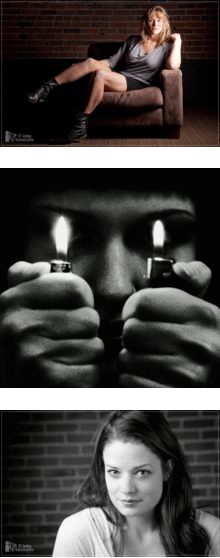 White Hot, playing at Fremont’s West of Lenin, closes February 11. Tickets here. 16 and over.
White Hot, playing at Fremont’s West of Lenin, closes February 11. Tickets here. 16 and over.
So Bri, who is also director Braden Abraham, filling in for Tommy Smith, says to his wife Lil, or at her, she’s more of an accidental audience to his narcissistic monologue, that this guy he knows has written this story about thoroughly unlikeable characters, and even worse, there’s no optimism at all, none, and you have got to have optimism.
This is, as they used to say, rich coming from Bri, who is as short on hope as he is on empathy. He’s manipulative, deceptive, self-serving–Abraham has him wearing that precisely groomed non-beard peculiar to narcissists, and speaking with an affectless tone that means to sound “reasonable” but instead indicates that the person to whom he’s speaking is beneath contempt, or any other emotion, for that matter.
This is playwright Tommy Smith letting you off and back onto the hook. Yes, these aren’t likeable characters. No, it’s not going to be redemptive. But it may be, in its overheated, brutalizing way, truthful about the way we singe each other, scar and bruise. Intimacy here is just a way of saying “in harm’s way.”
Bri–who is damaged and unaware–stands in counterpoint to Sis, who is damaged and all-too-aware of it. Coarse, coked-up, and profane, Sis is played to the balls-deep hilt by Hannah Victoria Franklin, as a fleshy, tigerish, all-consuming emptiness in search of sensation. As her name implies, she’s the sister of Lil (Kimberly Sustad, whom you may know from such TV shows as Alcatraz and Supernatural), but she’s also an alter-ego: Where Sis motormouths her way through frighteningly hilarious riffs on the aftermaths of anal sex and birth, Lil feebly tries to “reclaim” her power from the abusive Bri by reciting self-help formulations.
Smith’s script feels written in a white heat–a step ahead of any restraining impulse. Mid-past-century concerns with “alienation” are here replaced by unapologetic pathology; there’s no attempt to pretty things up. If these characters are a little too completely their worst selves, that’s actually the point–it’s the worst selves who are most implicated when, for instance, Bri and Lil confront pregnancy, and the prospect of radically caring for another person intrudes upon their psycho(tic)drama. If a mythical normal person’s self-interested reservations and reluctance coalesced into corporeal form, you’d have Bri and Lil. If their hungers and self-destructiveness did, you’d have Sis.
That’s why, perversely, there is and isn’t hope in this world, and why the delivering angel-slash-possibly-Ukrainian-thug Grig (the awesomely-voiced, granitically impassive Ray Tagavilla) has come not to bring peace, but a kind of sword. From an egocentric perspective–and what else is there?–there is no such thing as transcendence, evolution. Just an endless line of unremarked upon graves of the people who had to die so that you could be who you are today.
The production–spare enough to fit into West of Lenin’s black box space–features a couch, blood spatter, “contemporary” costuming by Jennifer Zeyl, a geometric screen backdrop by Andrea Bryn Bush (supplemented by blasts from light tubes, with lighting by Jessica Trundy), and a jarring, scratchy noisescape by Emily Fassler. It becomes a place where you are unsure what comes next, and audience members jump visibly and cry out involuntarily.